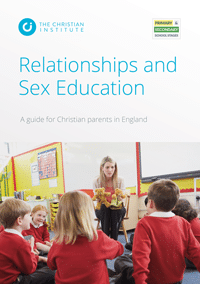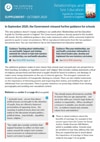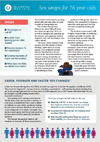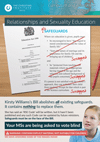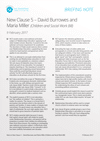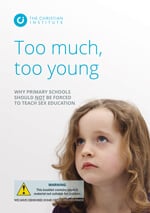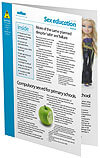England
Relationships Education in primary schools and RSE in secondary schools became compulsory in September 2020 in both state and fee-paying schools. All state schools are also required to deliver Health Education.
Relationships Education focusses on positive, non-intimate relationships such as those among family, friends and online.
Sex education covers intimate relationships and topics like consent, contraception and abuse. Primary schools are not required to deliver sex education, although they can do so if they wish.
Health Education includes teaching about puberty and mental and physical wellbeing.
Parents can withdraw their children from sex education, but not Relationships or Health Education. This right is automatic in primary schools, but a secondary school could override a parent’s request “in exceptional circumstances”.1 Pupils aged 15 or over are able to request to receive sex education, even if this is against their parents’ wishes.
RSE guidance expects pupils to be taught “LGBT content at a timely point”2 in RSE. Primary schools are not required to include this content, but often come under considerable pressure to do so. LGBT content is usually included in Relationships Education.
RSE must be appropriate to pupils’ age and religious background.3 Every school must have an RSE policy published on its website and must consult with parents before making or revising the policy.4 Christian parents will want to be part of the consultation process and to press for consultation if it appears changes have been made without this essential step.
In response to widespread concerns, the Government is reviewing its RSHE guidance for schools. A new version is expected to be published in 2024. It has also written to all schools telling them they must allow parents to see teaching materials.
A guide for Christian parents in England
There are good things that can be taught under the new arrangements but unfortunately the changes also provide an opportunity for campaign groups opposed to Christian teaching to push forward their controversial agendas in schools.
In September 2020, the Government released further guidance for schools
Wales
New requirements for RSE in Wales were introduced in September 2022 and apply to primary and secondary schools as well as state-funded nurseries. The changes do not apply to independent schools.
Schools need to teach the content set out in the RSE code. This is broad and includes topics like friendship, kindness and respect, but also controversial concepts like gender equality and changing attitudes towards gender and sexuality. Sexual health and wellbeing elements cover contraception, abortion and that all people are “entitled” to “pleasurable relationships”.
Under the new curriculum, parents no longer have a legal right to withdraw their children from this education.
RSE must be “developmentally appropriate”,5 meaning it needs to take into account the pupils’ knowledge, maturity, emotional development and additional learning needs.6 Schools must also “provide a range of views on a given subject, commonly held within society” when dealing with “questions of values”.7
Parental and community engagement are central to the ethos of the Curriculum for Wales8 and guidance recommends “2-way engagement with parents, carers, and the wider school community”.9 Parents can approach schools to offer feedback, provide input and to ask questions or raise concerns.
Scotland
Relationships, Sexual Health and Parenthood education (RSHP) is taught in primary and secondary schools. It forms part of the Health and Wellbeing area within the Curriculum for Excellence. RSHP is a broad subject covering topics like friendship, puberty and parenting as well as intimate relationships, sexual health and abuse. Most schools follow the learning descriptors set out in the Curriculum for Excellence. All schools are required to follow Government guidance for RSHP.
Many schools use materials available from the website, RSHP.scot. However, this is not a requirement. RSHP should also not be confused with the ‘LGBT inclusive curriculum’, which is also optional.
Parents can request for their child to be withdrawn from the sexual health element of RSHP.
RSHP must be appropriate to pupils’ age and stage of development. Draft guidance expects pupils to learn about sexual orientation, gender reassignment and different types of family, including LGBT parenting. At the same time, it requires schools to provide RSHP that is “inclusive of all faiths and beliefs” and enables all pupils to “express and share their beliefs and values”.
The guidance directs schools to regularly involve parents in discussions about RSHP. Parents can proactively approach schools with questions, feedback and suggestions concerning this subject.
Northern Ireland
The law concerning RSE in Northern Ireland changed in September 2023. From January 2024, all post-primary schools are required to deliver “age-appropriate, comprehensive and scientifically accurate education on sexual and reproductive health and rights, covering prevention of early pregnancy and access to abortion”.10 The changes do not affect primary schools.
Parents have the right to withdraw their children from all or part of the content delivered under the new requirements. This can be done in writing to the school principal and the request needs to be renewed annually. For pupils in year 12, parents need to confirm that their child does not object to being withdrawn.11
RSE must be age-appropriate and scientifically accurate. Schools are required to develop an RSE policy and programme based on their ethos and in consultation with parents, governors, staff and pupils. Parents’ views must be “reflected fully” in the policy.12 Parents can make the most of this opportunity to ensure their views on RSE are heard and respected in the school’s policy and programme.
Ireland
RSE forms part of Social, Personal and Health Education (SPHE) in the Republic of Ireland. The SPHE curriculum in post-primary schools is currently undergoing changes. In September 2023, the new curriculum for the junior cycle (the first three years of post-primary school) began to be rolled out. A public consultation on the senior cycle curriculum closed in November 2023. It is expected that an updated primary school curriculum specification will be implemented from September 2025 with a public consultation planned for 2024.
Under Irish law, children can be withdrawn from “any subject which is contrary to the conscience of the parent”,13 including RSE.
The curriculum for the junior cycle states that pupils should learn to “appreciate…how sexual orientation and gender identity are experienced and expressed”.14 But schools must not promote a particular viewpoint on these controversial issues.
Schools are required to consult with parents about how they “promote the moral, spiritual, social and personal development of students”15 through SPHE. So parents can play a part in influencing RSE delivered in Irish schools. The ideal time to do so is while the changes are ongoing and schools’ plans in this area are still at a formative stage.
References
1 Relationships Education, Relationships and Sex Education (RSE) and Health Education, Department for Education, 25 June 2019, page 18
2 Ibid, page 15
3 Education Act 2002, Section 80A
4 Education Act 2002, Section 80B
5 Curriculum and Assessment (Wales) Act 2001, Section 24(2)
6 RSE Code, page 3
7 Curriculum for Wales: Summary of legislation, Welsh Government (available at https://hwb.gov.wales/curriculum-for-wales/summary-of-legislation/#relationships-and-sexuality-education as at 18 March 2024)
8 Welsh Parliament, Record of Proceedings, 2 March 2021, col. 367
9 Curriculum for Wales: Summary of legislation, Welsh Government (available at https://hwb.gov.wales/curriculum-for-wales/summary-of-legislation/#relationships-and-sexuality-education as at 18 March 2024)
10 The Education (Northern Ireland) Order 2006, Article 5(1A) as amended by the Relationships and Sexuality Education (Northern Ireland) (Amendment) Regulations 2023
11 Circular 2024/1, Department of Education, 1 January 2024
12 Ibid
13 Education Act 1998, Section 30(2(e))
14 SPHE 2023: SPHE learning outcomes and wellbeing indicators, Curriculum Online (available at https://www.curriculumonline.ie/Junior-Cycle/Short-Courses/SPHE-2023/SPHE-learning-outcomes-and-wellbeing-indicators/ as at 18 March 2024)
15 Education Act 1998, Section 9(d)
